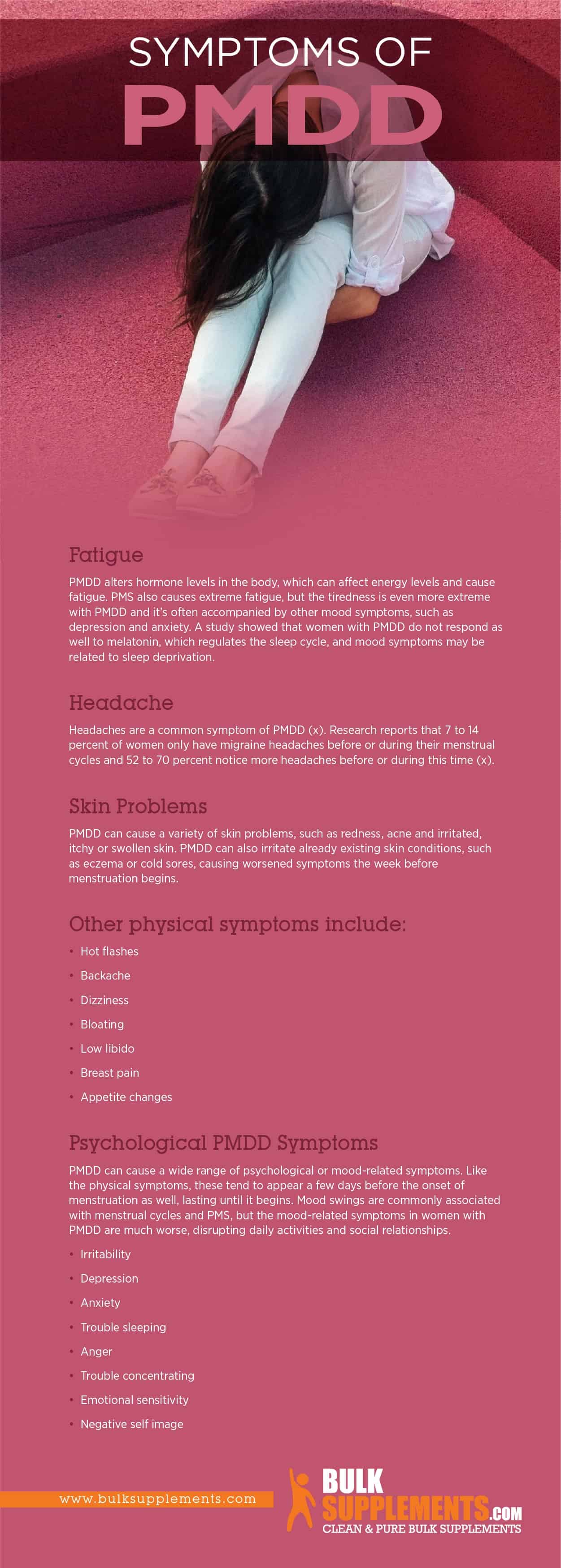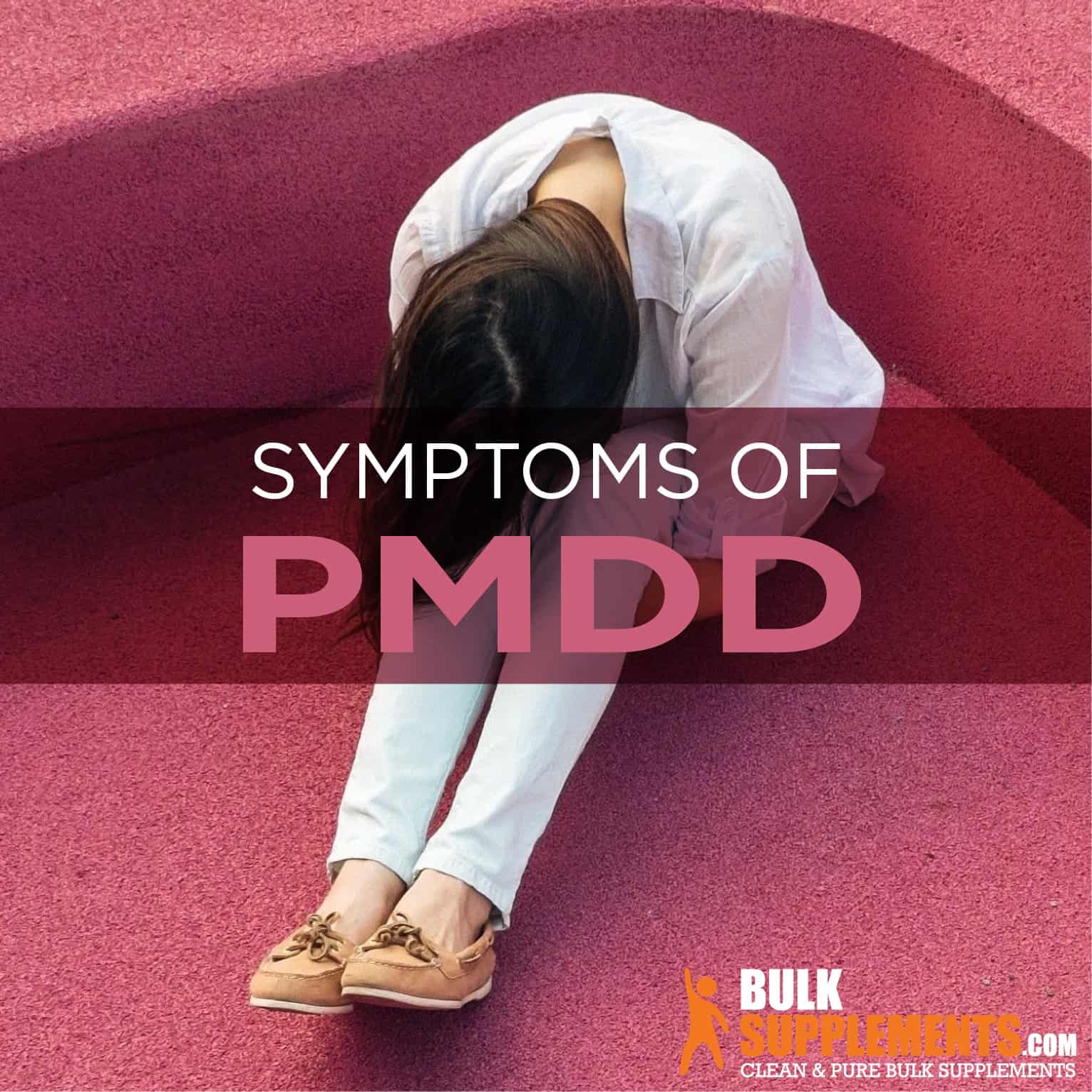What is PMDD?
Premenstrual dysphoric disorder (PMDD) is a severe form of the more common premenstrual syndrome (PMS) that may interfere with your school, work and personal relationships. For centuries people called it “women’s problems” because some said it disrupted the lives of those impacted. (x) It causes physiological changes during menstruation, including depression, anxiety and anger as the body becomes exhausted. There is also often a range of physical symptoms associated with PMDD, including abdominal cramps, bloating, skin problems and headaches. (x)
Natural remedies may help, and many women report the benefits of taking a more practical approach to relieve menstrual problems, even when they are severe and debilitating. Most doctors also recommend yoga and relaxing exercises because they help the nervous system and balance hormones. (x)
PMDD affects hormone levels in your body. All women have the same hormone, but it varies in quantities. Depending on your levels, it can lead to moodiness, agitation and anxiety, and depression, (x) all of which are PMDD symptoms. Studies show that up to 15 percent of women with the condition may feel like attempting suicide. (x) That’s why it’s essential to get treatment right away if you notice any severe physical or mood changes related to menstruation. The remedies are through nutrition and lifestyle changes. (x) It may require finding a physician who understands the physiological changes and helping your body overcome them through noninvasive treatment, such as nutrition, diet and exercise.
PMDD Symptoms
PMDD features a wide range of symptoms. Not all women experience the same symptoms, and they can differ in severity depending on the case and the month. But to be diagnosed with PMDD, you must have experienced at least five symptoms, including at least one mood-related sign for most of your cycles over the last year. Ideally, you become aware of the possibility of having PMDD and begin changing your lifestyle for the better. These symptoms usually appear
about a week before menstruation begins and lasts for a few days after it starts. (x)
Physical PMDD Symptoms
Understanding the physical symptoms of severe menstrual problems like PMDD will enable you to know how your body is going through changes every month. Though you might wish your period never started, some women want it to start. The physical reactions include:
- Fatigue
PMDD alters hormone levels in the body, which can affect energy levels and cause fatigue. (x) PMS also causes extreme fatigue, but the tiredness is even more extreme with PMDD and may have other mood symptoms, such as depression and anxiety. A study showed that women with PMDD do not respond to melatonin, which regulates the sleep cycle, and mood symptoms may relate to sleep deprivation. (x)
- Headache
Headaches are a common symptom of PMDD. (x) Research reports that 7 to 14 percent of women only have migraine headaches before or during their menstrual cycles, and 52 to 70 percent notice more headaches before or during this time. (x)
- Skin Problems
PMDD can cause various skin problems, such as redness, acne and irritation, itchy or swollen skin. PMDD can also irritate existing skin conditions, such as eczema or cold sores, causing worsened symptoms the week before menstruation begins. (x)
Other physical symptoms include: (x)
- Hot flashes
- Backache
- Dizziness
- Bloating
- Low passion
- Breast pain
- Appetite changes
Psychological PMDD Symptoms
PMDD can cause a wide range of psychological or mood-related symptoms. It’s vital to understand these moods happen because your body is going through changes. Like the physical symptoms, these tend to appear a few days before the onset of menstruation, lasting until it begins. Most nutritional doctors look at your diet and see what if triggering these moods. Mood swings relate with menstrual cycles and PMS, but the mood-related symptoms in women with PMDD may be much worse, managing daily activities and social relationships. (x)
- Irritability
- Depression
- Anxiety
- Trouble sleeping
- Anger
- Trouble concentrating
- Emotional sensitivity
- Negative self-image
Causes & Risk Factors for PMDD
PMDD has strong links to hormonal changes in menstruation. Women with PMDD may respond negatively or abnormally to the normal hormones in their bodies that increase during menstruation. (x) Sometimes PMDD can result from hormone imbalances, and if you have this condition you need to get a skill physician and check your hormone levels. (x)
- Estrogen
Estrogen is one of the main hormones involved in menstruation, and levels rise and fall throughout a woman’s cycle. Changes in estrogen influence mood, including irritability and anxiety, but researchers do not know precisely why or how. PMDD responds to estrogen, and research confirms that some women have a biological sensitivity to it, resulting in PMDD. (x) (x).
- Progesterone
Progesterone plays an essential role in reproduction. Levels fall when bleeding begins in menstruation, which is usually when PMDD symptoms occur. Women with PMDD are more sensitive to progesterone, which stimulates hormone activity in the body. One study experimented with estrogen and progesterone levels, turning them off and adding them back into the body to trigger PMDD symptoms, confirming hormone sensitivity. (x) (x)
- Serotonin
Menstrual hormone changes can affect serotonin levels in the body. Serotonin is a neurotransmitter with speculation that it may influence your mood, and sudden drops may cause depression, anxiety and other mood conditions. (x)
- Genetics
Women with a family history of PMDD may develop the condition themselves unless they have a lifestyle of exercise and nutrition. A few studies have documented the possibility, which brings your awareness up and the importance of maintaining a healthy lifestyle. (x)

PMDD Treatment
There is a wide range of treatment options to ease PMDD symptoms, including medications, hormone therapy, and natural remedies. Discuss with your physician a safe treatment for PMDD by taking a more natural approach with diet, exercise and supplements.
- Selective Serotonin Reuptake Inhibitors (SSRIs)
Though SSRIs may be the most common treatment option for depression, it is the most dangerous long-term side effect of dementia. (x) They increase serotonin levels, with a false success of improving your mood and reducing depression symptoms, but their side effects are detrimental. (x) Women should avoid taking them as much as possible and consider alternatives mentioned below. (x)
- Hormone Therapy
In some cases, doctors may recommend hormone therapy to interrupt abnormal signals in the circuit that regulates the reproductive cycle. Hormone therapy can improve many of the symptoms, which is an efficient approach, and there may also be noticeable improvements. (x) Bio-identical hormones may help you tremendously, available through compounding pharmacies. (x)
- Birth Control
Contraception can be effective by shortening or eliminating menstruation. Occasionally, it may cause irregular bleeding, but it may also relieve PMDD symptoms. Again, taking a more natural approach is better for your body. (x)
- Lifestyle Changes
As mentioned before, find a doctor that takes a more natural approach. Many doctors recommend lifestyle and diet changes. Gradually, you’ll see improvement in your overall health. Not only will your menstrual cycles improve but so will your outlook on life. You’ll create a positive impact around those you love. Your energy levels improve with a better attitude toward life. Increased exercise and smaller, more frequent meals low in caffeine, sugar and alcohol may help you. (x)
- Natural Remedies
In addition to standard treatment options, there are several natural remedies for PMDD. They are unlikely to treat the condition entirely, but they may offer relief for some of the symptoms. Inositol powder is an alternative to SSRIs, and studies have shown that it is effective for treating depression related to PMDD. (x) Essential oils can help relieve some of the symptoms as well. Lavender can relieve headaches and help regulate sleep, (x) and peppermint oil and eucalyptus oil can help with relaxation. (x)
Other natural remedies include magnesium and calcium. Magnesium may relieve bloating and reduce breast tenderness. Calcium is adequate for improving mood, lowering fatigue and reducing the risk of depression. (x) (x)
Supplements for PMDD
There is a range of effective supplements to treat PMDD symptoms. Taking supplements is the best remedy as it helps your body naturally repair itself or adjust the whole system. Talk to your physician about taking supplements, especially ones you haven’t taken yet. Some supplements include:
- Magnesium
Medical doctors prescribe magnesium for PMDD, 100 mg two to three times a day to relieve irritability and tight muscles and water retention. Combine it with vitamin B6 for even more beneficial results. (x)
- 5-HTP (5-hydroxytryptophan)
A helpful nutrient for menstrual suffers the amino acid 5-HTP, about 200 – 500 mg a day, depending on your needs. It will help you feel better and calm your mood by influencing your serotonin. (x)
- Inositol Powder
Research shows the benefits of herbal and dietary supplements to treat disorders like PMDD. (x) Inositol is a molecule that plays an essential role in serotonin transmission, and it may improve mood symptoms in people with PMDD. The recommended amount is 12 to 18 mg a day. (x)
- Alfalfa Extract Powder
Alfalfa is a plant that contains a wide range of nutrients. It’s also rich in phytoestrogen compounds that are like estrogen. (x) This may make alfalfa a helpful extract for people who have PMDD. The recommended dosage is 1,200 mg up to three times per day.
- Astragalus Extract Powder
Women with PMDD may experience hot flashes related to hormone changes. It can also cause night sweats, disturbed sleep and anxiety. Astragalus is an herbal supplement that may increase energy levels and reduce fatigue.
- Bilberry Extract Powder
Bilberry is used to treating a wide range of conditions, including menstrual pain. It’s an anti-inflammatory that may help reduce cramping and bloating, as well as prevent constipation.
- Biotin 1%
One of the B vitamins, biotin, is commonly used to improve nail and hair health. Many women with PMDD experience hair loss from stress and hormonal changes. Biotin improves hair health and may reduce hair loss from PMDD. (x)
- Black Cohosh Extract Powder
Traditionally used for symptoms related to PMS, black cohosh, a study found that it relieved menstrual cramps and psychological symptoms and hot flashes. It also has inflammatory properties to reduce bloating.
Where to Buy Supplements for PMDD or Menstrual Problems?
You can purchase these powders and supplements for menstrual problems or PMDD at BulkSupplements.com. The company is an industry-leading manufacturer and distributor of pure dietary supplements.
BulkSupplements.com is not just a consumer brand. It also supplies pure ingredients to other food and supplement brands to make their products. All products at BulkSupplements.com are manufactured and tested according to current and proper manufacturing practices.
Are you interested in trying any of these powders or supplements mentioned in this article as a possible solution to helping you with menstrual problems or PMDD? Contact BulkSupplements.com to place an order today.
The Bottom Line
PMDD may impact a woman’s ability to work, exercise and maintain healthy relationships. Symptoms can vary widely depending on the case. With some women, PMDD causes depression, anxiety, irritability and sudden mood changes. It may also cause a range of physical symptoms, including skin problems, headaches, bloating, cramping and nausea.
Some doctors do not entirely understand the causes of PMDD, but those who understand there is a sensitivity to hormones that fluctuate naturally during the menstrual cycle. Women can manage the symptoms with dangerous SSRIs that cause horrible side effects, birth control and hormone therapy. Natural remedies are also effective, such as essential oils, dietary changes and supplements.
If you experience PMDD symptoms, take a natural approach by getting a proper blood panel done to determine which nutrients or hormones your body needs to overcome the effects of your monthly menstrual cycle. Be patient, and you will succeed with a healthier body and mental well-being.
These statements have not been evaluated by the Food and Drug Administration. These products are not intended to diagnose, treat, cure or prevent any disease.


